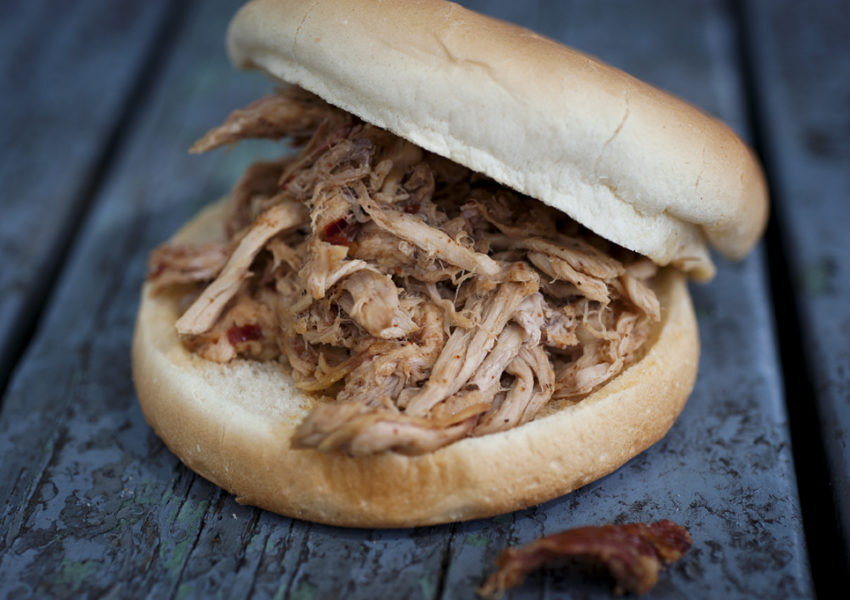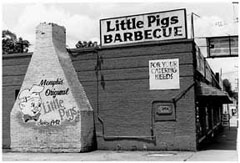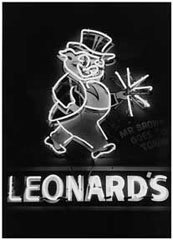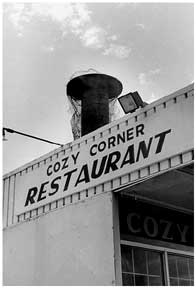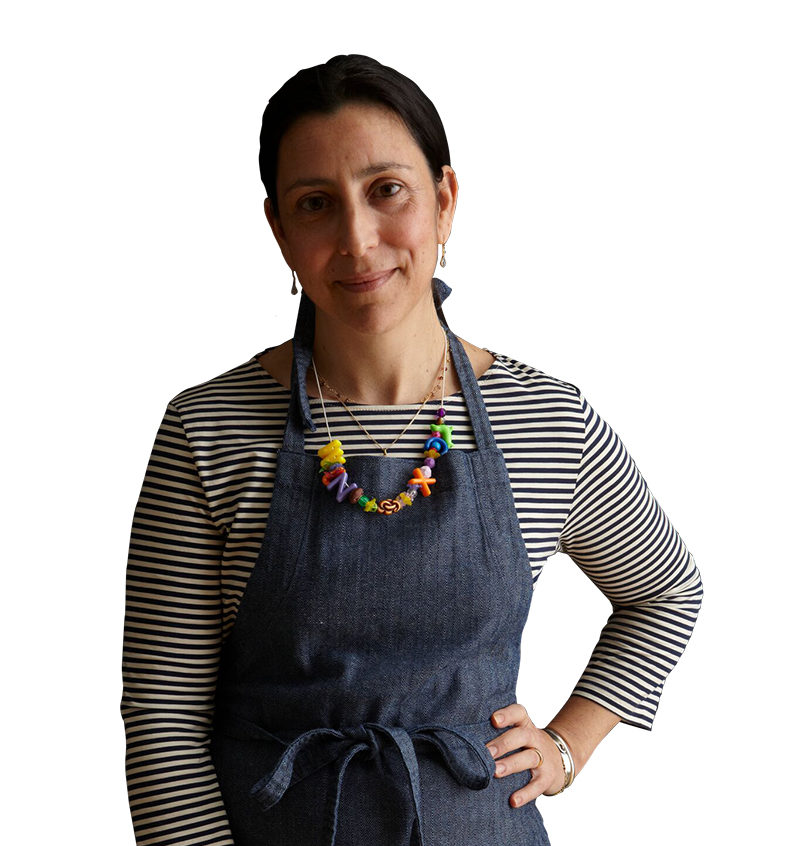< Back to Oral History project: Tennessee Barbecue Project
< Back to Oral History project: Rural Tennessee BBQ Project
< Back to Oral History project: Memphis Tennessee BBQ Project
ORAL HISTORY
Wilma Foster
SUBJECT: Wilma Foster
DATE: March 22, 2003
INTERVIEWER: April Grayson
—–
April Grayson: If you could start by telling me your name and the name of your business.
Wilma Foster: Wilma Foster, Foster’s Barbeque.
And could you tell me the year and where you were born?
Me?
If you don’t mind.
The year is 1952 is when I was born, and where—Stantonville, TN.
And how long have you been in business at this location?
A little over two years.
Ok. In this same building and everything?
Same building.
Ok. Have you run a barbeque business in any other location before?
No. This is it.
How did you get in the barbeque business?
Actually, I bought the convenience store next door and the barbeque business here, and the fellow that owned it before trained me to do it.
Kevin McKenzie.
So do you do all your own cooking?
Yes. We do everything homemade here. We do baked beans, slaw, potato salad. We do both vinegar and mayonnaise slaw. We do fried pies. I do those. And chocolate oatmeal cookies and chess squares. Those sell real good, too.
And do you do the actual barbeque cooking?
Yes. I do.
By yourself?
I did it by myself for a year, you know, and I turned it over to my son back in July. And then he decided that wasn’t for him, so I’ve taken it back over now.
What moved you to get in the barbeque business?
Well, the convenience store is really what attracted me, but the barbeque business went along with it. So we took both of them. And the barbeque business, turns out to be, it’s more profitable actually than the convenience store.
And you cook whole hog?
Whole hog.
Over an open pit, or?
Well, it’s not open. We’ve have it covered with sheet metal hoods, but we put the coals underneath. They’re on like a grate on concrete, concrete blocks. And we put the coals underneath on the bottom of the floor on the concrete and then it’s smoked.
And what kind of wood do you use?
Hickory. Nothing but.
Where do you get your wood?
We get it from B&B Sawmill just up the road. They do drumsticks, and it’s in little—I guess it’s 1”x1” sticks. And we burn those down ‘til there’s nothing but coals, and then we take the coals and put them underneath the hogs.
 How many days a week are you open for business?
How many days a week are you open for business?
Wednesday, Thursday, Friday, and Saturday.
And how many hogs do you cook and serve during that time?
During the winter, three. And then starting now, all the way through the summer, I’ll probably do four to five a weekend. And on holidays, like Fourth of July, we’ll do about twelve.
Now do you have a specialty here, or is it pretty much the barbeque sandwich?
We have family packs, too, that includes the chips and the, the chips and the side items.
Do you serve slaw on your sandwiches?
Only if they’re—I ask each person if they want slaw on it.
And you said you had vinegar and mayonnaise.
Right.
And, how long do you cook your hogs?
I cook them twelve hours, temperature ranging from 180 to 220. I don’t get any higher, and I definitely don’t get any lower.
So twelve hours. And do you flip them at some point?
When they’re ready to serve. I do mine just a little bit differently. I’ll cook them with the skin up, and then when we’re ready to serve them, we’ll flip them so the skin’s down. And it serves as a catch for grease and whatnot.
That seems kind of distinctive. What—does it give a different flavor? Why do you cook it like that?
I guess ‘cause it’s easier. It’s got a good flavor, though. That way the smoke actually comes up to the meat itself.
Ok. And what about sauce? Do you make sauce?
I make my own sauce. Hot and mild?
 Hot and mild. And is it a vinegar-based sauce, too?
Hot and mild. And is it a vinegar-based sauce, too?
Yes, it is.
Ok. Do most people eat the sandwiches or the plates with the sauce?
Almost always.
And what about slaw? Do most people eat it with slaw?
Um, I’d say about two-thirds.
Ok. And have you changed anything about the process of cooking or your recipes since you were trained by the previous owner? Have you modified anything in the past couple of years?
I have modified the baked beans, in that I put more ketchup and brown sugar.
Did the previous owner also cook with the skin up?
Yes.
And the same amount of time and everything?
Yes, he did.
So that you took directly from him?
Right.
Ok, great. Tell me about your clientele. Is it mostly local people, a lot of repeat customers?
A lot of repeat customers. I’d say ninety percent repeat. There’s a lot of truck drivers that come through, and a lot of them are repeat. There’s just, and a lot of local people. And on Fridays—I forgot to tell you—we do ribs and chicken on Fridays.
Great. Can you describe your typical workday? When you’re here, what time do you get here, and what time to you leave?
I get here at 7:30 in the morning and get the fire started. That way we have time to bring the barbeque back up to serving temperature by 10:00, is when we open. And then we close at 7 pm.
So what you serve at 10 or so is cooked, fully cooked the night before?
Right.
 So do you put the hogs on in the evening before you leave and let them cook all night, or do you cook them during the day while you’re here?
So do you put the hogs on in the evening before you leave and let them cook all night, or do you cook them during the day while you’re here?
I cook them during the day while I’m here. And then by the time they’re done, twelve hours later, they’re still serving temperature by the next morning when we get here.
And how many pits do have back there?
I can feasibly cook six. Let me see, two, no, six.
How do you see the future of your business? Do you think you’ll be here for awhile? Are you planning on expanding, or do you have any idea about that?
I, right now I can’t think, I’m so busy with the store and this, too, ‘cause I’m trying to run both of ‘em. I run back and forth. I had hoped to get into some catering, you know. Right now, I don’t have time, but I hopefully will build it to where I can have somebody out here and then cater.
Is it—do you feel like you’re in a unique position as a woman owning a barbeque business around here?
Yes! (laughs) For real. Because when I took over this business and started doing it myself, I had this one fellow who told my husband, he said, “I’ll give her two weeks.” I didn’t know this until about a month or two, probably two months later. He came and apologized to me, and I had no idea what he was apologizing for. Then he said, “Well, I told your husband that I give her two weeks, and you know, you’re still here, and I’m proud of you.”
Yeah. Is your husband involved in the business at all?
He is, nights, evening when he gets home from work and weekends, he’s very involved. He works another job where he travels all over Tennessee, in hydraulic work.
So this is pretty much your baby.
Pretty much.
Do you have time for much else?
No. None. Nothing.
You mentioned you have a son. How many kids do you have?
Just the one.
And how old is he?
He is thirty. He’s thirty.
But he found out quickly that he wasn’t really interested.
Right.
[A customer enters and comes to the counter.]I’ll let you get your customer.
Customer: Y’all are taking photographs!
She’s with me. [gestures to Amy Evans, taking photographs.] I’ll pause it.
[The customer turns out to be the man who told her husband he’d give her two weeks in the business and then later apologized.](to the customer) …I’ve just told her about that.
Customer: Uh-oh.
But I heard you apologized.
Customer: Naw, I didn’t apologize. I just admitted I was wrong.
(laughs) There’s a difference, right?
Customer: Wasn’t nothing to be sorry about.
You were suspect that she couldn’t do it own her own as a woman doing a barbeque business? Or what was your hesitation?
Customer: Oh, I ain’t even going into that!
(to Wilma) Do you spend the rest of the week when you’re not here at the convenience store?
Very much.
And who runs it while you’re here?
Well, I’ve got girls hired over there, and I’m just back and forth basically right now.
Ok. Do you think you’ll be in this for the long haul, or you just gonna take it—?
Yep! According to me and the bank. I’m in it for the long haul.
Ok. And what’s your favorite part of running the business?
Uh, making customers happy and doing it like they want it done. ‘Cause I do for them, not me.
Do you eat barbeque a lot?
Yes, I do.
What’s your favorite way to eat it?
I get a medium, coleslaw, and mild sauce.
On a bun?
On a bun.
And tell me about the murals, because that was part of the reason we stopped, the main reason we saw the business and stopped.
Actually, he’s a drunk. Anybody that does signs like this, you can bet you, they’re drunks. And they do better after they’ve had a quart of beer.
(Everyone laughs)
Well he did a good job, he must have been really smashed.
Trust me, he was really—mopped.
Did he approach you, or you knew that you wanted some signs like this?
No, he approached me. He wanted to redo the signing on the store, and I wanted this done on the barbeque pit. So, I had him do this.
Who came up with the design? Did you have the idea or did he just do whatever he wanted to do.
He just did whatever he wanted to do.
Are you happy with it?
Yeah. Pretty happy with it!
It’s an eye-catcher, that’s for sure.
Um-hmm, and I’m especially proud of the hours on the door because it’s been where people, if they drive by and we’re not open, they can see the hours and all that. And I had not had that other than just a little bitty sign in the window.
Do you ever serve out before you—I mean, do you ever sell out before 7:00?
Yes. Especially on Saturdays. See, I’ve got “Saturday until gone” [on the sign.]
Ok. Well, do you have any general philosophy about barbeque?
Hard work. Period.
Would you ever consider using a different kind of cooking?
No. This is the old way. The old way. People know it’s done like this, it’s what they’re looking for.
So you think local people wouldn’t eat it if it were done differently?
I don’t think so. They might eat it, but it’s, only if they can’t find anything else, or anywhere else.
So that tradition is important around here.
Um-hmm, very.
Do you think it’s particularly important in this area, as opposed to other areas?
I think so ‘cause that’s what we are, barbeque done this way.
Any other things you want to add?
I encourage more women to do it. Show these men that they can do it.
So when you put that hog on there—
Now, I have to have help doing that, getting them on and flipping them. I do have to have help doing that. Other than that, the cooking part, everything’s mine.
Heating up the coals, scooping the coals, and all that?
Um-hmm, and keeping the temperature right. Right temperature. ‘Cause I’ve got these little temperature gauges, you can see them there.
Uh-hmm.
When they drop below 180, I fire ‘em again. If they get past 220, you just hope and pray it’s not too much.
Right.
There’s nothing you can do to cool them down.
Well, thank you very much!
Thank you.
My pleasure.




